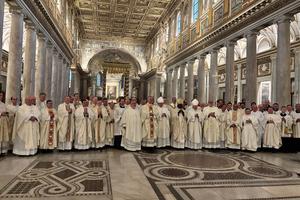Cardinal Müller: Cardinal Pell Was Pope Francis’ Best Theological Counselor
Cardinal Müller, who lived in the same apartment as Cardinal Pell in Rome, noted the cardinal’s strong intellectual formation in Oxford and his knowledge of patristic and systematic theology.

ROME — Cardinal George Pell was the best theologian on Pope Francis’ Council of Cardinals and a good papal counselor, Cardinal Gerhard Ludwig Müller, former head of the Vatican’s doctrinal office, said on Wednesday.
Cardinal Müller commented on the Australian cardinal’s theological prowess following Pell’s sudden death in Rome at age 81 from cardiac arrest.
The Pope’s former economy chief will be buried in Sydney, Australia, on Feb. 2 following a requiem Mass in St. Mary’s Cathedral. His funeral was held at St. Peter’s Basilica on Jan. 14.
Pope Francis is surrounded more by politicians than by good theologians, Müller said in a Jan. 18 interview with EWTN. “I think [Cardinal Pell] was the best counselor of Pope Francis.”
“I hope that we have in him a good intercessor in heaven for all the needs of the Church and all the challenges that we have,” said the prefect emeritus of the Congregation for the Doctrine of the Faith.
Cardinal Pell was an inaugural member of Pope Francis’ Council of Cardinals, a group of originally nine cardinals established in September 2013 to advise the Pope.
The other original members of the council were Cardinals Pietro Parolin, Seán Patrick O’Malley, Reinhard Marx, Óscar Andrés Rodríguez Maradiaga, Oswald Gracias, Giuseppe Bertello, Francisco Javier Errázuriz Ossa, and Laurent Monsengwo Pasinya.
Cardinal Müller, who lived in the same apartment as Cardinal Pell in Rome, noted the cardinal’s strong intellectual formation in Oxford and his knowledge of patristic and systematic theology.
After his ordination as a priest in 1966 in Rome, Cardinal Pell earned a licentiate degree in sacred theology from the Pontifical Urban University. He then took up doctoral studies at the University of Oxford and earned a doctorate in 1971 in Church history.
Cardinal Pell “met us regularly after he came back from Australia, where he was in a very brutal way, against all the evidence, sentenced for six years in prison,” Müller said, and “suffered 400 days and more in the prison, isolated.”
The cardinal “has testified with his life, and his great patience, to salvation in Jesus Christ,” Müller said, “because Jesus Christ redeemed us by his suffering on the cross; he didn’t protest it, he didn’t make a revolution with arms.”
“He is a very good witness and example for Christian life, in the intellectual dimension, but also in his suffering of this injustice” of trial and imprisonment, Müller said, adding that in his suffering, Cardinal Pell imitated Jesus Christ and the martyred apostles St. Peter and St. Paul.
- Keywords:
- cardinal gerhard muller
- cardinal george pell

















